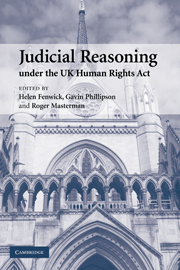Book contents
- Frontmatter
- Contents
- List of contributors
- Foreword
- Preface and acknowledgments
- Table of cases
- Table of legislation
- Table of treaties
- 1 The Human Rights Act in contemporary context
- PART I The interpretation of the Human Rights Act 1998
- PART II The Human Rights Act and substantive law
- 9 The common law, privacy and the Convention
- 10 Judicial reasoning in clashing rights cases
- 11 Family law and the Human Rights Act 1998: judicial restraint or revolution?
- 12 Article 14 ECHR: a protector, not a prosecutor
- 13 Criminal procedure, the presumption of innocence and judicial reasoning under the Human Rights Act
- 14 Concluding remarks
- Index
10 - Judicial reasoning in clashing rights cases
Published online by Cambridge University Press: 30 October 2009
- Frontmatter
- Contents
- List of contributors
- Foreword
- Preface and acknowledgments
- Table of cases
- Table of legislation
- Table of treaties
- 1 The Human Rights Act in contemporary context
- PART I The interpretation of the Human Rights Act 1998
- PART II The Human Rights Act and substantive law
- 9 The common law, privacy and the Convention
- 10 Judicial reasoning in clashing rights cases
- 11 Family law and the Human Rights Act 1998: judicial restraint or revolution?
- 12 Article 14 ECHR: a protector, not a prosecutor
- 13 Criminal procedure, the presumption of innocence and judicial reasoning under the Human Rights Act
- 14 Concluding remarks
- Index
Summary
Introduction
Part I of this book concentrated largely on the mechanics of the Human Rights Act itself, the topic that has understandably tended to form the main preoccupation of the academic literature, while Part II considers aspects of its use in relation to various areas of substantive law, taking some account of its effect in curbing the power of public authorities as it impacts on individual rights. In contrast, this chapter examines judicial reasoning in clashing rights cases, concentrating especially on the intriguing and ambiguous decision of the House of Lords in Re S (A Child). There is not so far a great deal of literature considering the proper domestic approach to clashes of Convention rights, and this topic is also somewhat neglected in relation to the Convention itself. The horizontal effects debate has so far dominated the question of the governance of relations between private parties by the Human Rights Act (HRA). But little has been said in relation to instances in which the main question in relation to private parties is not that of the legal basis of their claims, but of their resolution in instances where conflicting Convention rights under the HRA enter the arena.
- Type
- Chapter
- Information
- Judicial Reasoning under the UK Human Rights Act , pp. 255 - 307Publisher: Cambridge University PressPrint publication year: 2007



